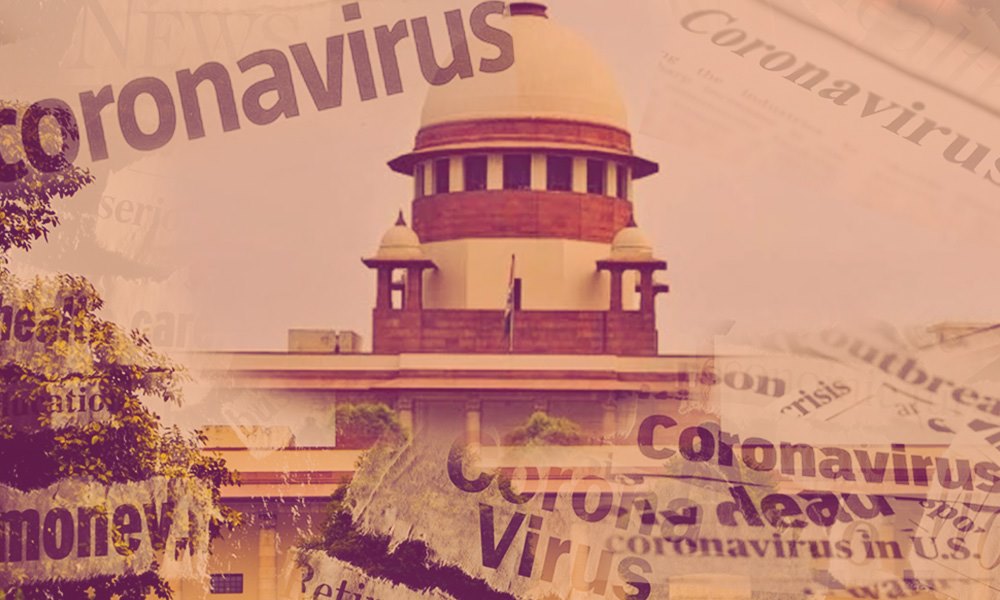
Image Credit: India Today
COVID-19 Vs Censorship: SC Asks Media Outlets To Publish Only Official Govt Info, But What About Transparency?
1 April 2020 9:55 AM GMT | Updated 1 April 2020 10:00 AM GMT
Editor : Shweta Kothari
A broadcast turned digital journalist, Shweta Kothari heads the newsroom at The Logical Indian. She has previously worked with CNBC and NewsX as a news anchor and senior correspondent. Shweta holds a masters degree in journalism from the university of Sussex, UK and started her career with work placement with BBC in Scotland.
The stringent orders came after the media brought the plight of the migrant workers to light and questioned the government for their imprudent attitude towards a large section of the society.
In an attempt to legalize censorship at a time when every little detail needs to reach every little household, the Supreme Court, in a first, has given the control of media's coverage of the COVID-19 pandemic in the hands of the Centre.
This order has stirred a massive row in the media industry, some of who feel that the decision will compel reporters to present only the government's version of the news.
In what most journalists see as a move to control independent reportage, the SC directed all media outlets to "refer to and publish the official version about all developments" in view of COVID-19.
"In particular, we expect the media (print, electronic or social) to maintain a strong sense of responsibility and ensure that unverified news capable of causing panic is not disseminated," the apex court's order read.
These scathing remarks were stated when the top Court was hearing a plea that sought welfare for the migrant laborers and workers who are stuck wihthout food, wages and shelter across the country amid the 21-day nationwide lockdown.
The plea was filed by Alakh Alok Srivastava.
The stringent orders came after the media brought the plight of the migrant workers to light and questioned the government for their imprudent attitude towards a large section of the society who are crucial for their vote banks, but remain neglected at a time when they're struggling for basic needs for survival.
The bench, comprising Chief Justice of India SA Bobde and Justice L Nageswara Rao, stated: "The migration of large numbers of labourers working in the cities was triggered by panic created by fake news that the lockdown would continue for more than three months. Such panic-driven migration has caused untold suffering to those who believed and acted on such news. In fact, some have lost their lives in the process."
The bench noted in the order: "It is therefore not possible for us to overlook this menace of fake news either by electronic, print or social media."
Adding a clarification to the order, the SC claimed that it did not "intend to interfere with the free discussion about the pandemic. However, it ordered the media to "refer to and publish the only official version about the developments".
"In particular, we expect the media (print, electronic or social) to maintain a strong sense of responsibility and ensure that unverified news capable of causing panic is not disseminated," the court's order read.
"A daily bulletin by the government of India through all media avenues, including social media and forums to clear the doubts of people, would be made active within a period of 24 hours as submitted by the Solicitor General of India," it added.
The top court's direction came after the Centre shared its fear that "fake and inaccurate reporting" might lead to "panic in the society".
The report read: "Considering the very nature of the infectious disease which the world is struggling to deal with, any panic reaction by any section of the society based upon such reporting would not only be harmful for such a situation but would harm the entire nation.
The Modi government sought directions from the court that no media outlet should publish or telecast anything on coronavirus without confirming the facts with the government.
The Logical Indian Take
As the country battles the deadly pandemic and struggles for basic essentials amid a nationwide lockdown, poeple get access to necessary information through several media outlets, who put their lives at risk, bring ground reports and experts opinions on COVID-19.
Reporters on ground, at hospitals and near COVID-19 hotspots bring us how the country is fighting a pandemic which has infected as many as 1,600 people in the country so far.
Media outlets in every form, print, television and digital have been reaching out to people to adopt hygienic habits and follow the expert's advisories to stay safe.
Something that the government claims to be an attempt to curb spread of fake news, is likely to turn into censorship of content at a time when every person should be equipped with every detail.
The order compels the fourth pillar of democracy to turn into stenographers of the government. It goes against the ethos of the industry, for which independence is of utmost importance.
The role of media is to put out facts, but also act as a bridge between the government and the people of this country. It is their right to hold the government or people accountable when they see the need to, and for the larger good of the society.
Also Read: 'Sprayed Migrants With Soap Water, Not Bleach': Kerala Officials Claim Following Criticism
 All section
All section













